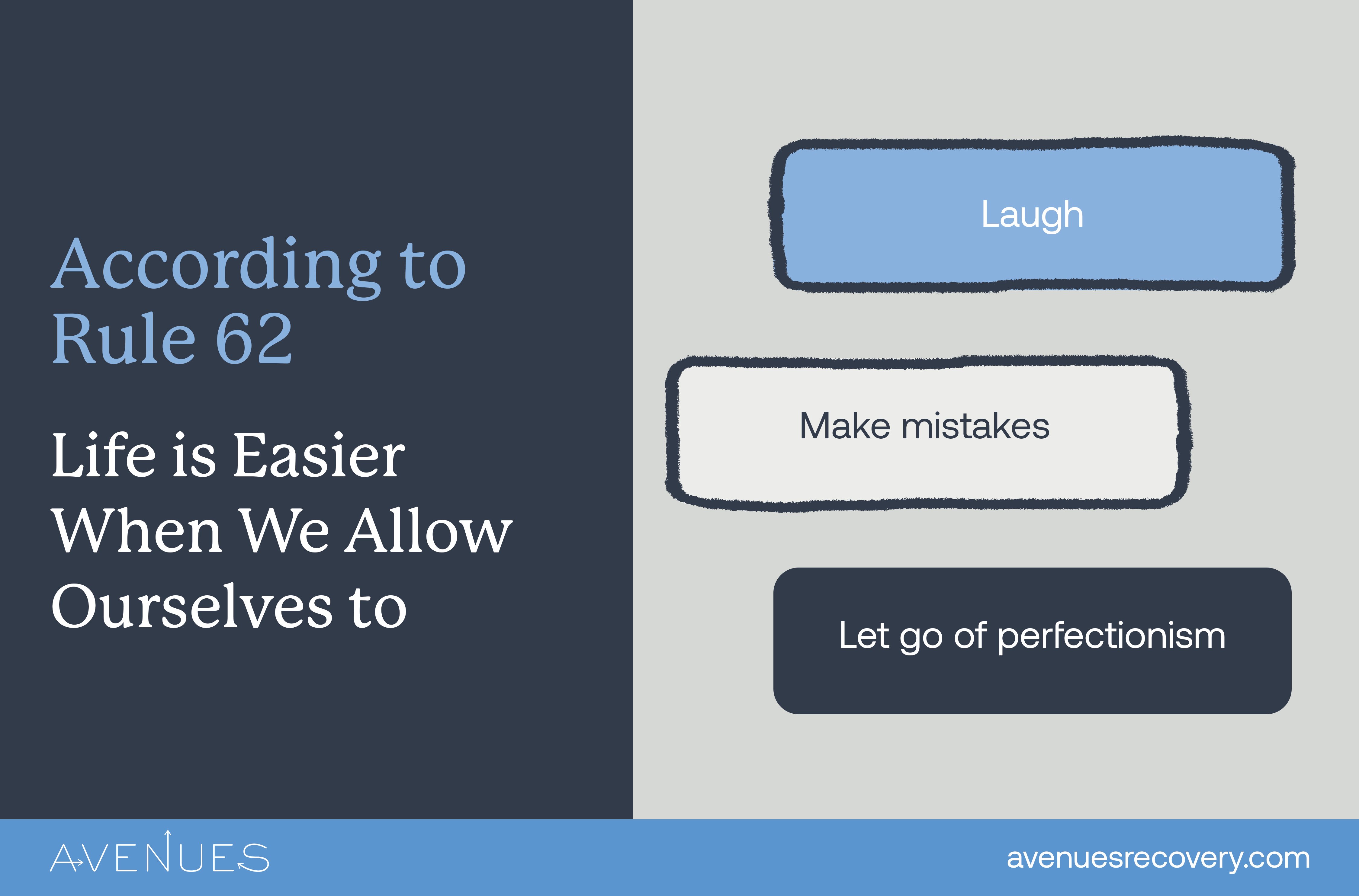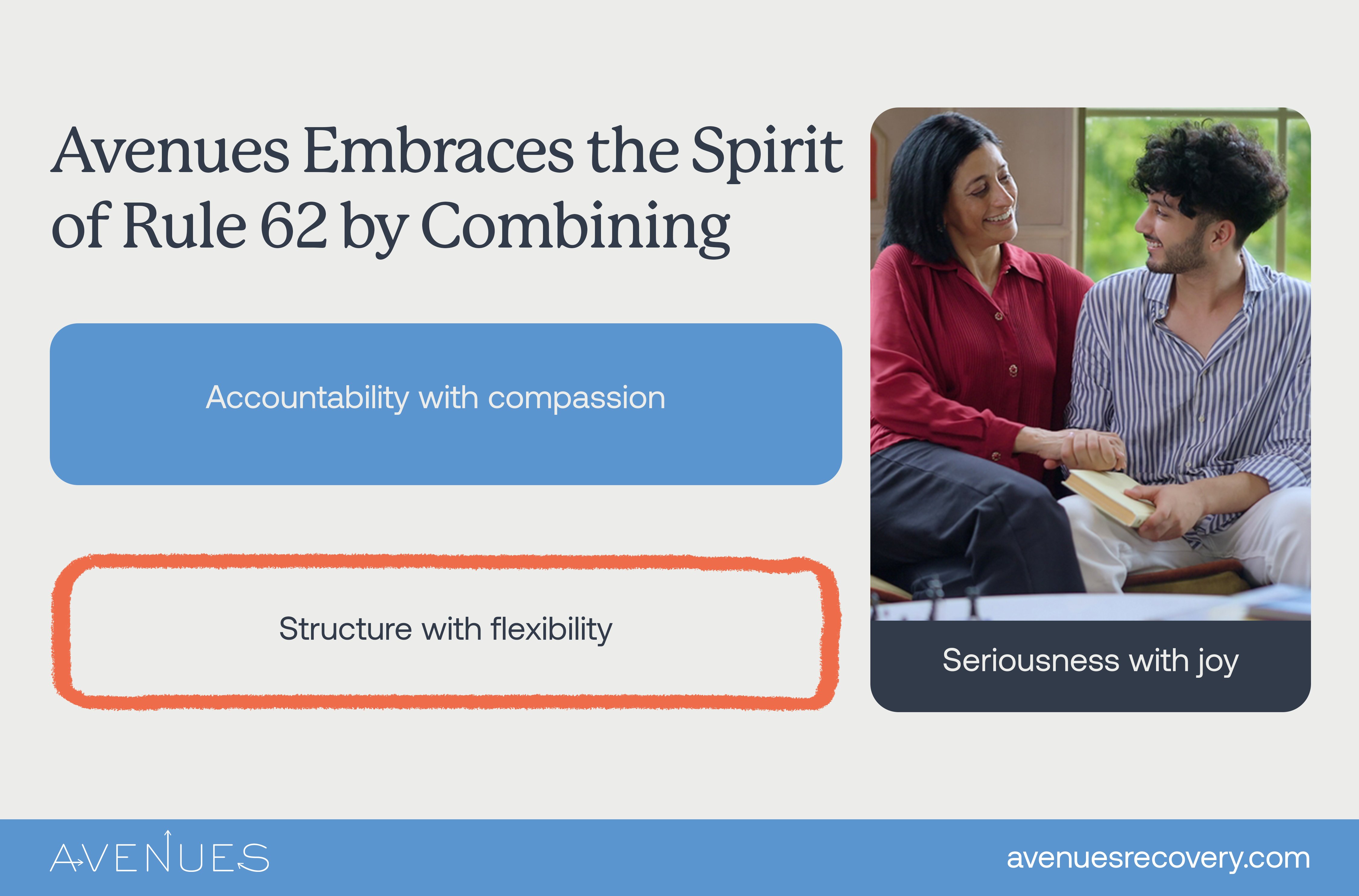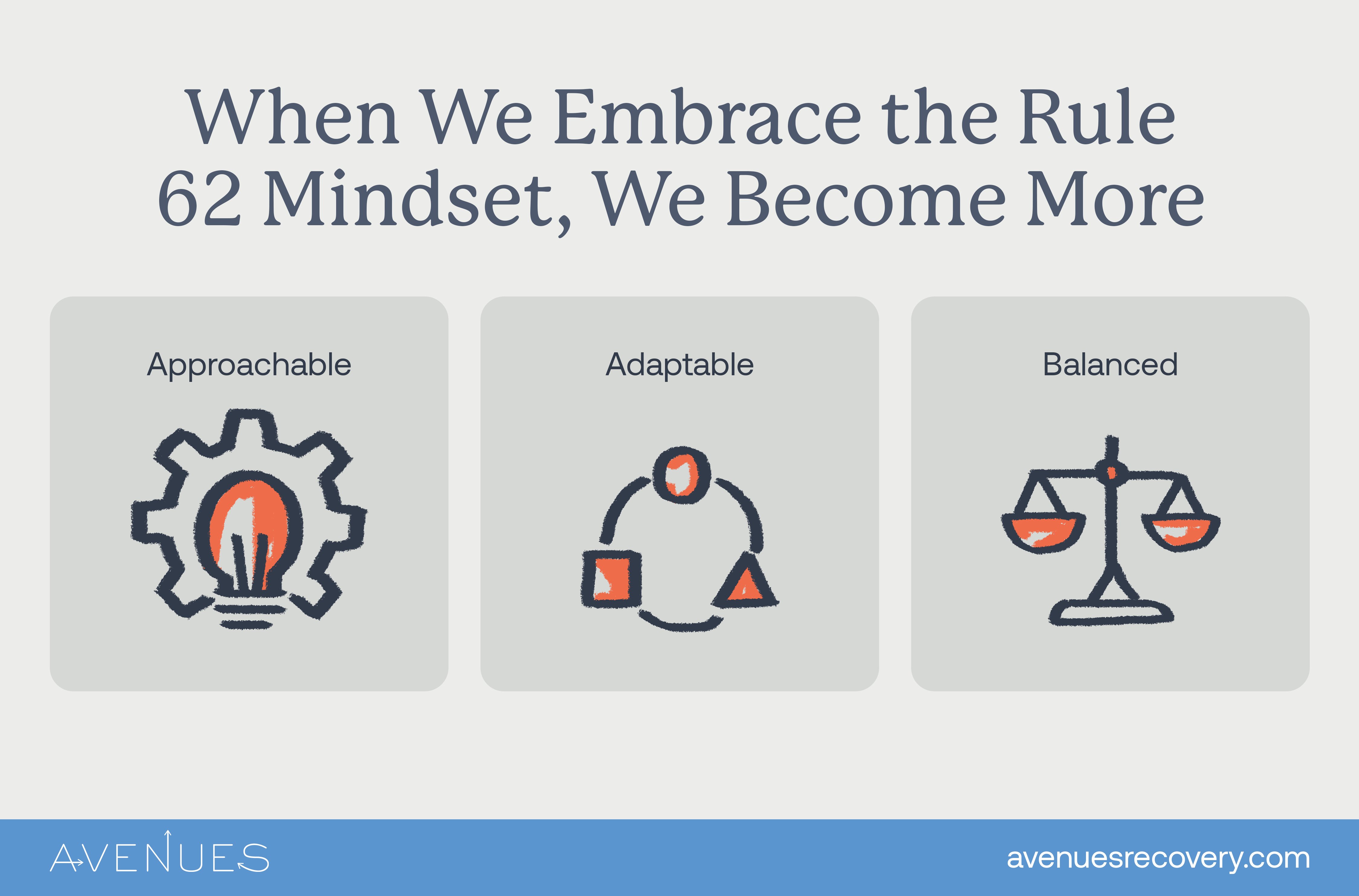Key Takeaways:
- At its core, Rule 62 reminds you not to take yourself too seriously.
- Smiling, laughing, and sharing lighthearted moments with peers in recovery make the journey bearable.
- Rule 62 began when AA over-regulated recovery, failed, then posted: “Don’t take yourself too seriously.”
- By not inflating our sense of control or importance, we leave room for learning and growth.
What is Rule 62?
If you’ve ever heard someone mention Rule 62 in recovery circles, you may have wondered, what is Rule 62? At its core, Rule 62 is a simple reminder not to take yourself too seriously. Rule 62 comes from a story in Alcoholics Anonymous (AA) history, where members learned that sometimes, humility and humor are the best guides on the path to sobriety. The phrase has become more than just a catchy saying; it represents a mindset that encourages flexibility, laughter, and perspective when life feels overwhelming.
At Avenues Recovery, we believe in this same principle – that healing doesn’t have to be rigid. It can be compassionate, balanced, and even joyful. Discover how our approach can support your recovery journey at Avenues Recovery.

Story Behind Rule 62
The story behind Rule 62 AA begins with an AA group in Washington, D.C. that tried to create a highly structured set of rules for recovery. They drafted dozens of regulations, hoping to perfect the process of sobriety. But the project soon collapsed under its own weight. Eventually, a small sign was posted at their location that read: “Rule 62: Don’t take yourself too seriously.”
This humorous yet wise message quickly spread throughout the AA community. The lesson was clear: sobriety from drugs and alcohol thrives not in overregulation but in authenticity, humility, and freedom from unnecessary rigidity. The rule became a cornerstone of Alcoholics Anonymous culture, a safeguard against taking recovery—or oneself—too far into extremes.
Don’t Take Yourself Too Seriously
AA Rule 62 is simple but powerful: life is easier when we allow ourselves to laugh, to make mistakes, and to let go of perfectionism. Many people in recovery struggle with shame, control, or fear of failure. By embracing humor and humility, they find breathing space to heal.
Not taking yourself too seriously doesn’t mean minimizing the importance of recovery; instead, it means keeping perspective. Sobriety is about progress, not perfection, and Rule 62 Alcoholics Anonymous reminds us that joy and laughter are just as essential to healing as discipline and commitment.

How Rule 62 Applies in Recovery
In day-to-day recovery, Rule 62 AA encourages humility. By not inflating our sense of control or importance, we leave room for learning and growth. Flexibility allows us to adapt when challenges arise without falling into despair.
Joy also plays a central role. Smiling, laughing, and sharing lighthearted moments with peers in recovery make the journey not only bearable but meaningful. Rule 62 AA meetings often reflect this blend of honesty and humor, where people can face their struggles while still finding reasons to laugh together.

Rule 62 in AA Meetings Today
If Rule 62 is mentioned in an AA meeting, you’ll often notice a lighter atmosphere. While the focus remains on staying sober and supporting each other, the principle ensures that recovery isn’t overly rigid or grim. People share stories, sometimes painful, but often sprinkled with humor that helps everyone relate.
This approach reminds participants that even serious struggles can be faced with a lighter heart. AA Rule 62 lives on in these gatherings as both a practical tool for coping and a cultural reminder of the deeper values in recovery—humility, compassion, and joy.
Lessons for Life Beyond Recovery
Rule 62 isn’t only for those in recovery. Its wisdom applies broadly to life—whether in the workplace, in relationships, or in personal growth. Taking ourselves too seriously can lead to burnout, conflict, or unnecessary stress.
When we embrace the Rule 62 mindset, we become more approachable, adaptable, and balanced. In work and relationships, a sense of humor and humility can defuse tension, strengthen bonds, and keep priorities in perspective. It’s a timeless life lesson that extends far beyond Alcoholics Anonymous.
Why Humor and Humility Support Sobriety
Recovery is rarely a straight path, and setbacks can often feel crushing. But humor provides a release valve, helping people view challenges through a lens of humanity instead of despair. Laughter bonds people and reinforces the idea that no one is alone in their struggles.
Humility also supports long-term sobriety. By recognizing that none of us has all the answers, we open ourselves up to learning, connection, and growth. Together, humor and humility—at the heart of Rule 62 AA—form a foundation for resilient, sustainable recovery.

Avenues Recovery’s Philosophy: Balance and Compassion in Healing
At Avenues Recovery Center, we embrace the spirit of Rule 62. We believe that recovery works best when it blends accountability with compassion, structure with flexibility, and seriousness with joy. A healing environment doesn’t have to be cold or rigid—it should be warm, balanced, and infused with laughter.
Our programs are designed to help individuals reclaim not just their sobriety but also their joy in living. With professional support, community, and a focus on balance, Avenues Recovery helps people find freedom from addiction with dignity, compassion, and strength.
Reach out today – you can find your way home too!


